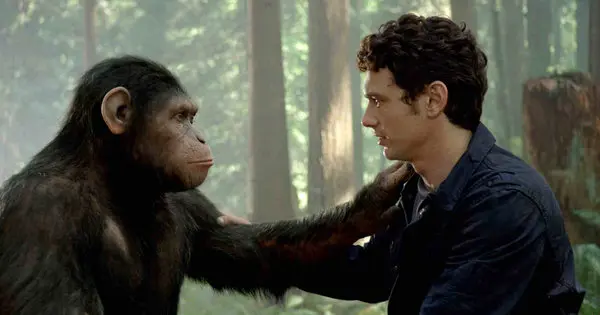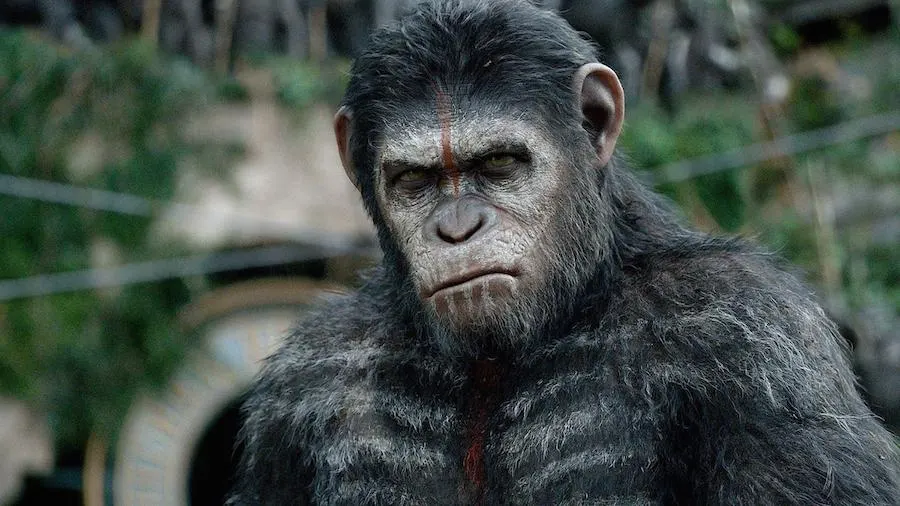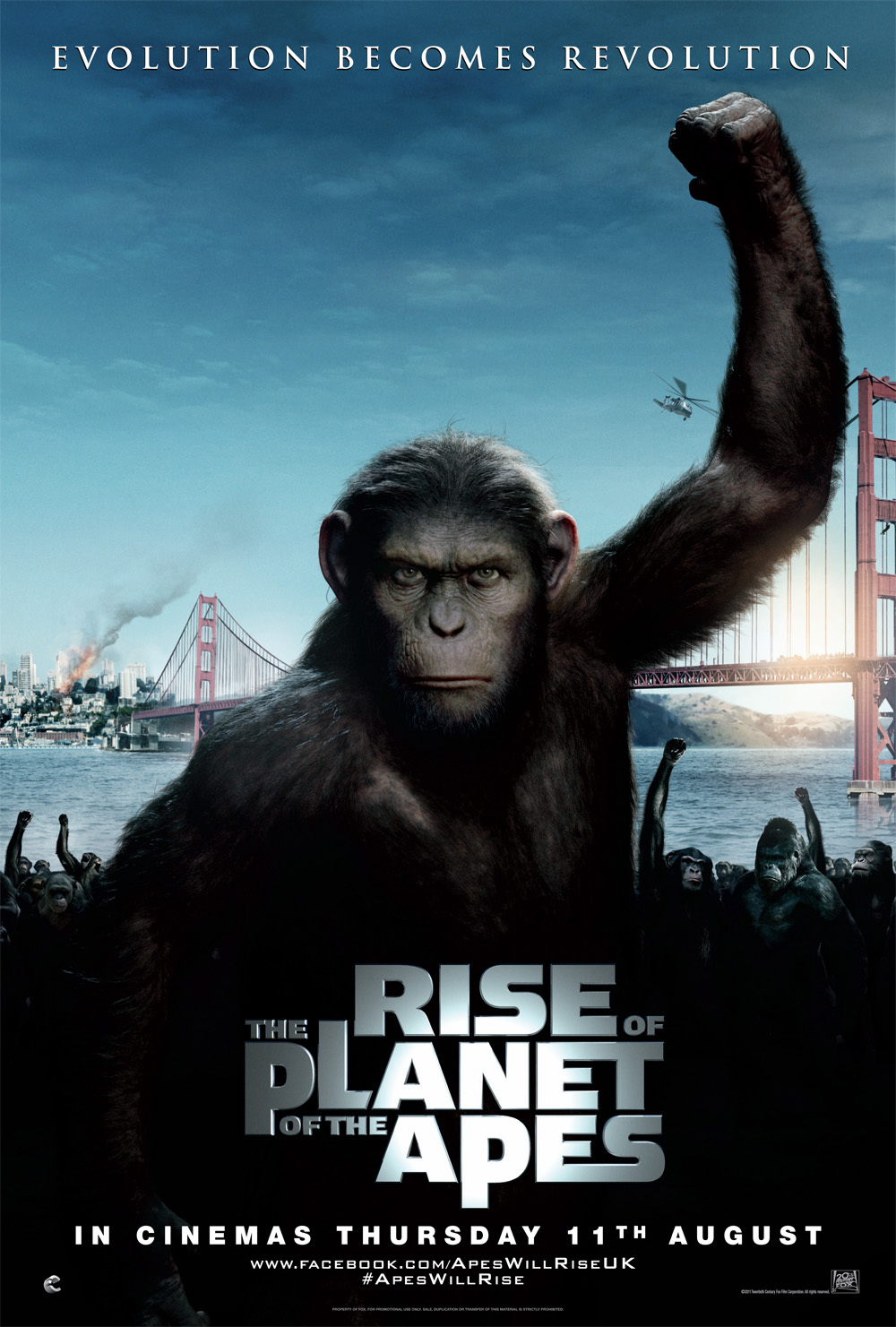Review by Chlo Hickson
As Kingdom of the Planet of the Apes approaches I will be revisiting Caesar’s trilogy – as they are connected – and I am so excited to be going back to their world and seeing how they have evolved without Caesar’s guidance.
If you’re like me, you’ll be completely fascinated by the story of this film. I’m a big fan of the Planet of the Apes and to get to see how it all started has been really engaging.
 Out of all of the movies, I think this is one of the best ones. It’s just absolutely spectacular! The writers: Rick Jaffa and Amanda Silver created a really compelling, exciting and touching script. Rise of the Planet of the Apes is technically a prequel to the 1968 Planet of the Apes; however, it ignores what came before it in the franchise. This cautionary tale feels surprisingly fresh and entertaining, given that this is the sixth Planet of the Apes movie. This film is part of a trilogy that can stand alone as an alternate history of how the world got to where it was when Charlton Heston landed. Rise of the Planet of the Apes tells the origin of an apocalypse, with the ending telling us how most of humanity gets wiped out – with details fleshed out in the second and third movies. Granted the movie does push humanity’s downfall to the background as much as possible. We do see occasional shots of Franklin going through the symptoms of the Simian Flu before dying.
Out of all of the movies, I think this is one of the best ones. It’s just absolutely spectacular! The writers: Rick Jaffa and Amanda Silver created a really compelling, exciting and touching script. Rise of the Planet of the Apes is technically a prequel to the 1968 Planet of the Apes; however, it ignores what came before it in the franchise. This cautionary tale feels surprisingly fresh and entertaining, given that this is the sixth Planet of the Apes movie. This film is part of a trilogy that can stand alone as an alternate history of how the world got to where it was when Charlton Heston landed. Rise of the Planet of the Apes tells the origin of an apocalypse, with the ending telling us how most of humanity gets wiped out – with details fleshed out in the second and third movies. Granted the movie does push humanity’s downfall to the background as much as possible. We do see occasional shots of Franklin going through the symptoms of the Simian Flu before dying.
As Caesar grows older, he begins to question himself, and learns that, while he’s not a pet, he’s caught between worlds. He’ll never be accepted among mankind, and he’s never lived amongst apes. ‘What is Caesar?’ He asks Will. The answer comes when Caesar is forced to live with other apes. At this point the movie really belongs to Caesar, and Will is mostly creating plot points leading up to the virus that takes out humanity. There’s still a bond between the two characters, but the real story is Caesar finding his place in the world and making a new family in the process. Previous Apes movies have had an emotional core, but none with the exception of Escape have hit it as hard as Rise. The family aspect is what grounds the entire movie, and it’s essential because without the relationships between Will and Charles, Will and Caesar, and most importantly, Caesar and his apes, the film is just there to show off its amazing visual effects. Rise of the Planet of the Apes isn’t about making the audience upset. It wants to give them a positive message about family and community.
 Rise is about Caesar, he’s the first ape to gain intelligence, he’s the leader of the ape revolution and the main character of this trilogy. He is the most important character. If you saw the trailers, you’d think that the main character would be James Franco’s character Will Rodman, the scientist who created the ALZ112 who made Caesar intelligent in the first place. But that isn’t what happened. This movie is about Caesar because it is about the rise of the apes. Caesar’s story is one of self-discovery and finding home, about understanding what he is and where he belongs and what it means. This starts with his relationship with Will Rodman. Will was his father figure; this is where it gets interesting because he comes to believe that he’s human. As he grows up it gets harder to ignore that he’s different. He’s on a lead like a pet, he can’t speak like a human, he’s different, but he doesn’t know what this means. There’s this moment where he looks into a mirror and although he says nothing you can tell what he’s feeling. The confusion, shame, denial. Caesar doesn’t want to be an ape. And this is more important than anything else. Will doesn’t help with this. By growing up with Will and his dad Caesar has grown to trust them, even if their decision was one he wouldn’t like, like the decision of going into the ape sanctuary. Caesar sought to protect Charles. He was just protecting his own, but in doing so he comes to realise they aren’t his own and the world doesn’t see a person protecting his friend they see a wild animal going rabid. They’re afraid of him and he’s ashamed of that. Ashamed of what his instincts made him do. When Caesar is taken to the ape sanctuary he is scared and confused, treated like the animal he doesn’t want to believe that he is but when Will arrives, he takes his hand. He believes that he has his best interests, he believes that Will won’t treat him like the animal everyone else does. Caesar has been brought to this place; he is forced to confront everything he can’t escape what he is. He tries to make friends with the apes, but they aren’t human enough for him and he isn’t ape enough for them. It feels like he doesn’t belong. When he reminisces about his home, he takes comfort in the window of his bedroom. This window is the most important symbol in the trilogy. There’s a duality to it, it’s a view outside, a means to see something just beyond your reach and it’s also a barrier. It lets Caesar look outside, it’s his connection to outside, but it’s also his connection away from it. Each time he goes beyond that window he’s punished for it. He goes to play with some kids and gets threatened with a bat, he goes out to help Charles and he gets taken to the ape sanctuary. What does Caesar draw on the wall of his cage? The window that acted as a barrier, because it was more than this. A cage without a window. He longed for it now because he’d at least have something. This is where we understand what this movie is really about. The phsycology of oppression.
Rise is about Caesar, he’s the first ape to gain intelligence, he’s the leader of the ape revolution and the main character of this trilogy. He is the most important character. If you saw the trailers, you’d think that the main character would be James Franco’s character Will Rodman, the scientist who created the ALZ112 who made Caesar intelligent in the first place. But that isn’t what happened. This movie is about Caesar because it is about the rise of the apes. Caesar’s story is one of self-discovery and finding home, about understanding what he is and where he belongs and what it means. This starts with his relationship with Will Rodman. Will was his father figure; this is where it gets interesting because he comes to believe that he’s human. As he grows up it gets harder to ignore that he’s different. He’s on a lead like a pet, he can’t speak like a human, he’s different, but he doesn’t know what this means. There’s this moment where he looks into a mirror and although he says nothing you can tell what he’s feeling. The confusion, shame, denial. Caesar doesn’t want to be an ape. And this is more important than anything else. Will doesn’t help with this. By growing up with Will and his dad Caesar has grown to trust them, even if their decision was one he wouldn’t like, like the decision of going into the ape sanctuary. Caesar sought to protect Charles. He was just protecting his own, but in doing so he comes to realise they aren’t his own and the world doesn’t see a person protecting his friend they see a wild animal going rabid. They’re afraid of him and he’s ashamed of that. Ashamed of what his instincts made him do. When Caesar is taken to the ape sanctuary he is scared and confused, treated like the animal he doesn’t want to believe that he is but when Will arrives, he takes his hand. He believes that he has his best interests, he believes that Will won’t treat him like the animal everyone else does. Caesar has been brought to this place; he is forced to confront everything he can’t escape what he is. He tries to make friends with the apes, but they aren’t human enough for him and he isn’t ape enough for them. It feels like he doesn’t belong. When he reminisces about his home, he takes comfort in the window of his bedroom. This window is the most important symbol in the trilogy. There’s a duality to it, it’s a view outside, a means to see something just beyond your reach and it’s also a barrier. It lets Caesar look outside, it’s his connection to outside, but it’s also his connection away from it. Each time he goes beyond that window he’s punished for it. He goes to play with some kids and gets threatened with a bat, he goes out to help Charles and he gets taken to the ape sanctuary. What does Caesar draw on the wall of his cage? The window that acted as a barrier, because it was more than this. A cage without a window. He longed for it now because he’d at least have something. This is where we understand what this movie is really about. The phsycology of oppression.
 Since 1968 the Planet of the Apes movies have always played around with the fears and challenges of its time and proven that the question ‘what if apes ruled over mankind’ continues to capture the imagination and meaningfully explore the nature of humanity. The various Apes films have given us metaphors for nuclear war, radiation, racial tensions, global spread of disease, animal rights, class and military aggression. Whatever film you’re watching all of them are cautionary tales telling us to be mindful of how far we push nature and to be wary of our own worst selves. At the heart of each story is the metaphor of the ape within the human. The Planet of the Apes was inspired by a 1963 book of the same name by French author Pierre Boulle, the premise is the subjugation by superior species. Scenes in Conquest for the Planet of the Apes echoes violent protests. In the original Planet of the Apes there is a hierarchy of colour. Lighter skinned orangutangs at the top, chimps in the middle and black skinned gorillas at the bottom. On a deeper level the reboot imagines the franchise with modern enemies such as Alzheimer’s, the pharmaceutical industry, animal cruelty, as well as people themselves. Caesar only feels his pain at being confined and treated badly because he is more intelligent. He is only able to unite the other apes due to his improved intelligence, and thus, his closeness to humanity. It’s a film about what it means to be human and how this is shown is by comparison with other animals. Caesar is a figure as an object of pity/compassion because he is more than an ape, he’s becoming human. The drama rests upon speech being the greatest weapon of power. The power to say ‘No’ is the movie’s ultimate moment. While being in the ape sanctuary Caesar learns nothing but prejudice, cruelty, and finally, betrayal are the things he comes to understand about humanity. But it is the knowledge about the nature of power that finally brings about Caesar’s rebirth as a leader and a revolutionist but being in a revolution requires you to cut off all your former allies; your only family is your friends in the conflict. This is the painful conclusion Caesar comes too. The pain, regret and ultimately resolution that flows across his face, makes for remarkable drama. There is genuine emotion there, and the fact that it takes place on a CGI ape is extraordinary.
Since 1968 the Planet of the Apes movies have always played around with the fears and challenges of its time and proven that the question ‘what if apes ruled over mankind’ continues to capture the imagination and meaningfully explore the nature of humanity. The various Apes films have given us metaphors for nuclear war, radiation, racial tensions, global spread of disease, animal rights, class and military aggression. Whatever film you’re watching all of them are cautionary tales telling us to be mindful of how far we push nature and to be wary of our own worst selves. At the heart of each story is the metaphor of the ape within the human. The Planet of the Apes was inspired by a 1963 book of the same name by French author Pierre Boulle, the premise is the subjugation by superior species. Scenes in Conquest for the Planet of the Apes echoes violent protests. In the original Planet of the Apes there is a hierarchy of colour. Lighter skinned orangutangs at the top, chimps in the middle and black skinned gorillas at the bottom. On a deeper level the reboot imagines the franchise with modern enemies such as Alzheimer’s, the pharmaceutical industry, animal cruelty, as well as people themselves. Caesar only feels his pain at being confined and treated badly because he is more intelligent. He is only able to unite the other apes due to his improved intelligence, and thus, his closeness to humanity. It’s a film about what it means to be human and how this is shown is by comparison with other animals. Caesar is a figure as an object of pity/compassion because he is more than an ape, he’s becoming human. The drama rests upon speech being the greatest weapon of power. The power to say ‘No’ is the movie’s ultimate moment. While being in the ape sanctuary Caesar learns nothing but prejudice, cruelty, and finally, betrayal are the things he comes to understand about humanity. But it is the knowledge about the nature of power that finally brings about Caesar’s rebirth as a leader and a revolutionist but being in a revolution requires you to cut off all your former allies; your only family is your friends in the conflict. This is the painful conclusion Caesar comes too. The pain, regret and ultimately resolution that flows across his face, makes for remarkable drama. There is genuine emotion there, and the fact that it takes place on a CGI ape is extraordinary.
Performance capture makes all the difference in this movie. Actors step into a body suit and the computer captures every move and expression and then animates it. The actors are not a digital add on. They are right there on set, in the full body suit, playing scenes with the human actors and the result pays off.
 I think this is the best acting that’s ever been seen in the entire Apes franchise and I know that there is a debate about motion capture actors getting Oscars but I look at Andy Serkis’ performance and I see an incredibly talented actor pour his heart and soul into the character: he just does such an incredible job at conveying emotions and so many different types of expressions through his eyes and his body language. The more I’ve seen Serkis in different roles and then go back and re-watch this movie and you can really see and feel him in this role. Its not just a digital performance. You can’t have a movie work as well as this does without a great character at the center of it and you get that from Andy Serkis.
I think this is the best acting that’s ever been seen in the entire Apes franchise and I know that there is a debate about motion capture actors getting Oscars but I look at Andy Serkis’ performance and I see an incredibly talented actor pour his heart and soul into the character: he just does such an incredible job at conveying emotions and so many different types of expressions through his eyes and his body language. The more I’ve seen Serkis in different roles and then go back and re-watch this movie and you can really see and feel him in this role. Its not just a digital performance. You can’t have a movie work as well as this does without a great character at the center of it and you get that from Andy Serkis.
Just as a character, Caesar has a powerful and compelling arc, I think he’s the most relatable and human character in the entire Planet of the Apes franchise. He’s a character that you just want to root for from the beginning and that’s without any dialogue! He makes you believe and love this character. He is incredibly well realized. I absolutely love Caesar and that’s because of what Serkis does in the role. He is the heart and soul of the movie from start to finish and it wouldn’t be the same without him.
 I also want to mention the original film even though it’s hard to compare the two. This is an origins story that makes the original better. The original was more about plot than the characters and they each stand apart with their own advantages and flaws. This new trilogy also pays respect to the original movies with a few Easter eggs reinventing characters such as Caesar, other characters such as Bright eyes, Cornelia and Cornelius are also tributes made famous by the original. Maurice the Orangutan was inspired by the actor Maurice Evans who played doctor Zaius. Dodge Landon the caretaker at the ape sanctuary gets to say one of the most iconic lines in the Apes franchise. Then there are major connections such as Caesar shouting ‘No’ (A reference to what Cornelius said when he told us ape history in Escape). These little moments show that while we might not be in the same mythology of the original saga, we’re not completely out of it either.
I also want to mention the original film even though it’s hard to compare the two. This is an origins story that makes the original better. The original was more about plot than the characters and they each stand apart with their own advantages and flaws. This new trilogy also pays respect to the original movies with a few Easter eggs reinventing characters such as Caesar, other characters such as Bright eyes, Cornelia and Cornelius are also tributes made famous by the original. Maurice the Orangutan was inspired by the actor Maurice Evans who played doctor Zaius. Dodge Landon the caretaker at the ape sanctuary gets to say one of the most iconic lines in the Apes franchise. Then there are major connections such as Caesar shouting ‘No’ (A reference to what Cornelius said when he told us ape history in Escape). These little moments show that while we might not be in the same mythology of the original saga, we’re not completely out of it either.
While taking a sharp diversion from its original roots, it does an amazing job of delivering what everyone wanted from this movie: A massive apocalypse. An uprising that sees the apes going up against humanity. It’s made it all the more exciting by the anticipation and the feel for these characters, the fantastic point about Caesar’s character is that we sympathise with him, we understand why he leads an ape army, and we cheer him on through it. And for that its brilliant. Overall, it’s entertaining and even moving. For these special effects alone, this reboot is worth watching.

